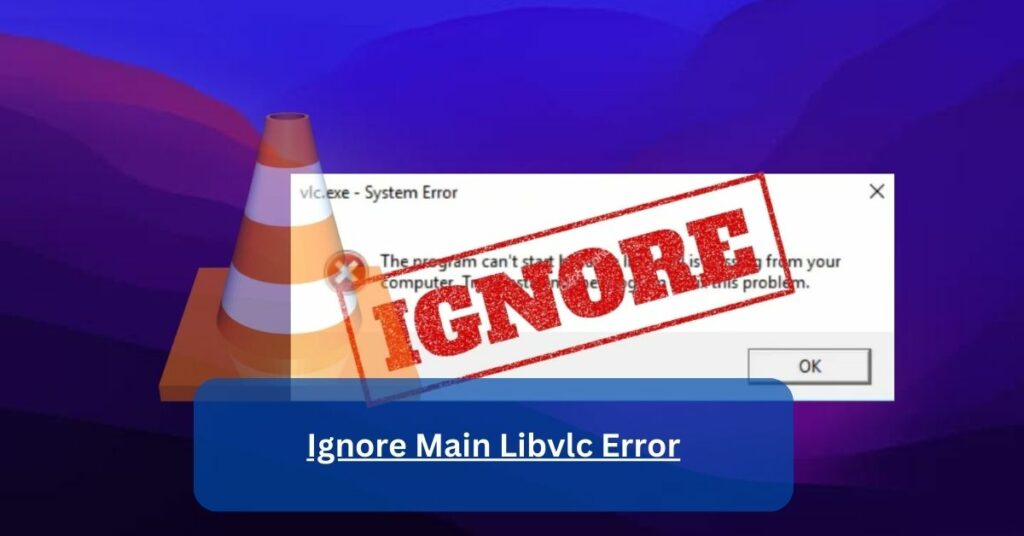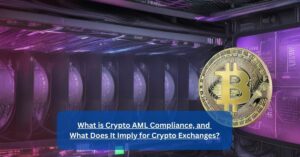Ignore Main Libvlc Error

Multimedia apps are everywhere these days, letting us watch and listen to stuff without any hassle. But sometimes, these apps use special tools like libvlc to work properly. Now, if you’re using one of these apps and you see a message like “ignore main libvlc error,” don’t panic! We’re here to explain what it means, why it happens, and what to do about it.
The message “ignore main libvlc error” typically appears in the context of programs or applications that utilize the libvlc library. LibVLC is a multimedia framework that is capable of rendering video and audio on various platforms. It is part of the VLC media player project.
In this article, we’ll unravel the mystery behind this message, exploring its implications, common causes, and best practices for handling errors gracefully.
What is “Ignore Main libvlc Error”?
The message “ignore main libvlc error” typically appears in the context of multimedia applications utilizing the libvlc library for audio and video playback. When encountered, it signifies that an error has occurred within the libvlc library during runtime, but the application has been configured to overlook this specific error and continue functioning.
Common Causes Of Libvlc Errors – Learn How To Handle Libvlc Errors Like A Pro!
1. Missing or Corrupt Media Files: One of the primary reasons for encountering libvlc errors is missing or corrupt media files. If the application attempts to play a file that is not present or damaged, it may trigger an error.
2. Incompatible Codecs: Incompatibility with codecs required for decoding multimedia files can lead to errors in libvlc. Without the necessary codecs installed or available, the library may fail to properly decode and play the media.
3. Network Issues: When streaming media from online sources, network issues such as connectivity disruptions or slow internet speeds can cause errors in libvlc. Interruptions in the network stream may result in playback errors or buffering issues.
4. Configuration Problems: Misconfigurations in the libvlc library or the underlying system settings can also contribute to errors. Incorrectly configured parameters or settings may lead to unexpected behavior and errors during runtime.
Best Practices for Handling libvlc Errors
Implement Robust Error Handling: Developers should implement robust error handling mechanisms within their applications to catch and handle libvlc errors gracefully. This involves checking for error conditions and providing appropriate responses to mitigate the impact on the user experience.
Log Error Messages: Logging error messages is essential for debugging and troubleshooting purposes. By logging relevant information about libvlc errors, developers can identify and address issues more effectively.
Provide Informative Error Messages: When errors occur, it’s crucial to provide users with informative error messages that convey the nature of the problem and any necessary steps they can take to resolve it. Clear and concise error messages help users understand the issue and take appropriate action.
Why Is The “Ignore Main Libvlc Error” Appearing In My Multimedia Application?
The appearance of the “ignore main libvlc error” message in a multimedia application can be indicative of several underlying issues. Let’s delve into more detail to understand why this error may occur:
1. Missing or Corrupt Media Files:
When a multimedia application attempts to play a media file that is missing or corrupted, it can trigger errors within the libvlc library. The absence of essential media files required for playback can lead to the “ignore main libvlc error” message.
2. Incompatible Codecs:
Multimedia files often rely on specific codecs for encoding and decoding audio and video data. If the libvlc library encounters a media file with incompatible or missing codecs, it may fail to decode the file properly, resulting in errors. This can manifest as the “ignore main libvlc error” message.
3. Network Issues:
In applications that stream media from online sources, network issues such as intermittent connectivity, bandwidth limitations, or server errors can disrupt the streaming process. These network-related issues can cause errors within the libvlc library, leading to the appearance of the “ignore main libvlc error” message.
4. Configuration Problems:
Misconfigurations in the libvlc library or the application’s settings can also contribute to errors. Incorrectly configured parameters, paths, or dependencies may cause libvlc to encounter unexpected behavior, resulting in errors being logged and potentially triggering the “ignore main libvlc error” message.
5. Compatibility Issues:
Compatibility issues between the libvlc library and other components of the multimedia application stack can also lead to errors. This may include compatibility issues with operating system versions, hardware configurations, or other software libraries used in conjunction with libvlc.
6. Error Handling Mechanisms:
In some cases, developers may intentionally configure the application to ignore certain errors encountered within the libvlc library. While this approach may allow the application to continue functioning despite encountering errors, it is essential to ensure that critical issues are not overlooked and that appropriate error-handling mechanisms are in place to address them.
7. Insufficient Error Logging and Handling:
If the multimedia application lacks robust error logging and handling mechanisms, it may fail to diagnose and address errors encountered within the libvlc library properly. Inadequate error reporting and handling can make it challenging to identify the root cause of issues, leading to the “ignore main libvlc error” message.
How To Resolve The “Ignore Main Libvlc Error” – Discover Practical Solutions And Best Practices!
Fixing the “ignore main libvlc error” requires a systematic approach to identify and address the underlying issues causing the error. Here’s a detailed guide on how to fix this error:
Identify the Specific Error:
Begin by examining the logs or error messages associated with the “ignore main libvlc error.” Understanding the specific error or errors reported by libvlc will provide insights into the root cause of the issue.
Check for Missing or Corrupt Media Files:
- Verify that the multimedia files being accessed by the application are present and intact. If any files are missing or corrupted, replace them with valid ones.
- Ensure that the file paths specified in the application code are accurate and point to the correct locations of the media files.
Verify Codec Compatibility:
- Confirm that the required codecs for decoding multimedia files are installed and compatible with libvlc. You may need to install additional codec packs or update existing ones to ensure compatibility.
- Check the documentation or specifications of the multimedia files to determine the codecs they require for playback.
Resolve Network Issues:
- If the application streams media from online sources, troubleshoot any network issues that may be affecting connectivity or data transfer.
- Check for network congestion, firewall restrictions, or DNS resolution problems that could impede the streaming process.
- Implement error-handling mechanisms within the application to gracefully handle network interruptions and reestablish connections when necessary.
Review Configuration Settings:
- Examine the configuration settings of the libvlc library and the application itself to ensure they are correctly configured.
- Verify that any required environment variables, paths, or dependencies are properly set up.
- If the application relies on external libraries or plugins, ensure they are correctly integrated and configured.
Update libvlc and Dependencies:
- Ensure that you are using the latest version of the libvlc library and any relevant dependencies. Newer versions may include bug fixes, performance improvements, and compatibility updates that address known issues.
- Check the official libvlc documentation or community forums for any reported issues or fixes related to the error you’re encountering.
Implement Robust Error Handling:
- Enhance the error-handling mechanisms in your application to detect and respond to libvlc errors more effectively.
- Log detailed error messages and diagnostic information to aid in troubleshooting and debugging.
- Provide informative error messages to users, guiding them on how to resolve common issues or directing them to relevant support resources.
Test and Validate:
- After implementing potential fixes, thoroughly test the application to ensure that the “ignore main libvlc error” no longer occurs under normal usage scenarios.
- Test various multimedia files, network conditions, and edge cases to validate the robustness of the error-handling solution.
Monitor for Recurrence:
Monitor the application in production or testing environments for any signs of the error recurring.
Continuously monitor logs and user feedback to identify and address any new issues that may arise.
By following these steps and systematically addressing the underlying causes of the “ignore main libvlc error,” you can effectively fix the error and ensure the stability and reliability of your multimedia application. Remember to document any changes made and maintain clear communication with stakeholders throughout the troubleshooting and resolution process.
FAQs (Frequently Asked Questions):
1. Is it safe to ignore libvlc errors?
Ignoring libvlc errors should be approached with caution. While some errors may be non-fatal and allow the application to continue functioning, others may indicate underlying issues that require attention.
2. How can I troubleshoot the “ignore main libvlc error” in my application?
Troubleshooting “ignore main libvlc error” requires identifying the root cause of the error. Start by checking for missing or corrupt media files, ensuring compatibility with required codecs, and verifying network connectivity.
3. Can updating libvlc resolve “ignore main libvlc error” messages?
Updating libvlc to the latest version may address certain errors, as newer releases often include bug fixes and improvements.
4. Are there any known bugs in libvlc that could trigger “ignore main libvlc error” messages?
Like any software library, libvlc may have occasional bugs or issues that could trigger error messages. Developers should stay informed about known bugs and issues by regularly checking release notes, bug trackers, and community forums for updates and patches.
Conclusion:
In multimedia apps that use libvlc, seeing “ignore main libvlc error” can puzzle both users and developers. But if developers know why libvlc errors happen and follow good error-handling practices, they can make apps work better and deal with problems.
Remember, handling errors well is crucial for making strong and dependable multimedia apps.





